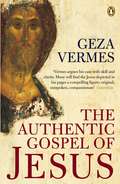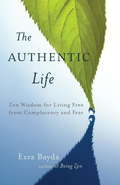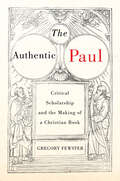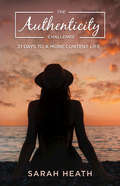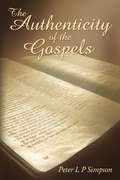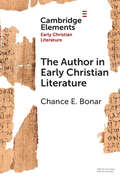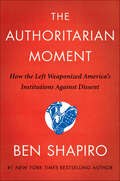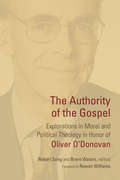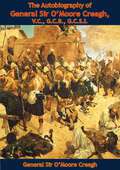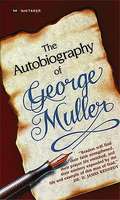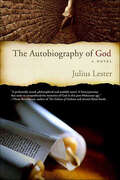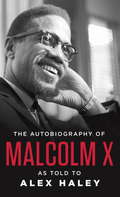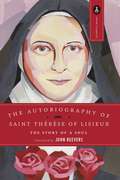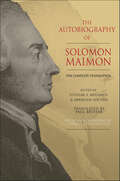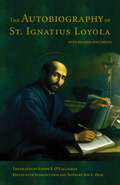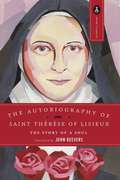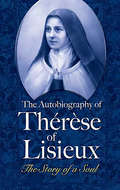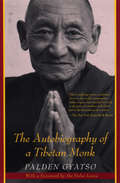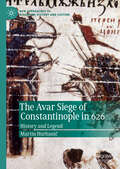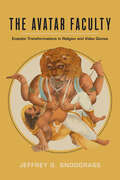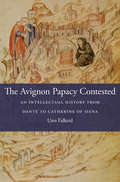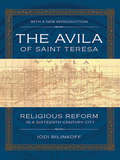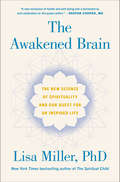- Table View
- List View
The Authentic Gospel of Jesus
by Dr Geza VermesThere can be no doubt that Jesus, 'a religious genius' as Geza Vermes describes him, lived and taught in Palestine some 2000 years ago. The influence he has had is incalculable. How though can we distinguish between the doctrines shaped to the needs of the burgeoning Christian church and the original views laid out by Jesus himself? How can we dig back through the additions, misinterpretations and confusions of later writers and two millennia of tradition to get back to the authentic gospel of Jesus? In his new book, Vermes subjects all the sayings of Jesus to brilliantly informed scrutiny. The result is a book of unique value and novelty--scraping aside the accretions of centuries to come as close as we can hope to be to the true Jesus.
The Authentic Life: Zen Wisdom for Living Free from Complacency and Fear
by Ezra BaydaEver feel like your efforts to live a life of wisdom, honesty, and compassion are hijacked by, well, life? Take heart. Ezra Bayda has good news: life's challenges aren't obstacles to our path--they are the path. Understanding that liberates us to use every aspect of what life presents us with as a way to live with integrity and authenticity--and joy. In this, as in all his books, Ezra's teaching is Zen made wonderfully practical, in a way that can apply to anyone's life. Meditation is the foundation, but it doesn't stop there. It's about learning to take the practice of presence we cultivate in meditation to all the rest of our complicated lives. Doing that empowers us to navigate our journey with the integrity and authenticity that are what a satisfying life are all about.
The Authentic Paul: Critical Scholarship and the Making of a Christian Book (Studies in Christianity and Judaism)
by Gregory FewsterWritten in the first century and compiled in the New Testament, the letters of the Apostle Paul have served as a reservoir of divine authority for Christians. Yet from the time of their writing, experts have claimed that some letters were altered or forged. Even after centuries, and generations of critical scholarship, an authentic book of Paul’s letters lacks consensus.The Authentic Paul traces the efforts of scholars, from antiquity to the modern period, who endeavoured to make an authoritative book of Paul’s letters free from textual variation and forgery. Engaging recent trends in the study of religion and book history, it challenges one of philologists’ fundamental assumptions: that authenticity is an inherent property of literature that can be recovered or destroyed. Gregory Fewster draws the philology of Paul, in both its ancient and modern forms, into the wider world of critical philology and its dynamic traditions of practice. Through analyses of ancient papyri and literary texts, early print journals, and critical editions, he shows how the value of authenticity is entangled with the ways that scholars assess Paul’s legitimacy and their own amid dense literary landscapes and intellectual debates.The Authentic Paul illustrates in vibrant detail what it means – in a world full of texts – to make the letters of Paul authentic, and why practices of authentication are always culturally determined.
The Authenticity Challenge: 21 Days to a More Content Life (The Authenticity Challenge)
by Sarah HeathFOMO, the fear of missing out, isn’t new. But today, social media makes us increasingly more aware of the fun, interesting, and enjoyable activities that others are experiencing. We yearn for the lives we assume others are already living. Through insights gained through her own journey toward contentment, author Sarah Heath found the answer to overcoming these feelings is to live an authentic life. Rather than longing for and chasing after somebody else’s life, you have to show up completely to your own life with honesty and courage. In The Authenticity Challenge, Sarah invites you to embrace authenticity in three key areas of your life: vocation (the What), relationships (the Who), and faith (the Why). Over the course of 21, days you will be guided through seven daily challenges each week related to one of these areas. Take the challenges on your own or combine with the DVD featuring Sarah in 8-10 minute video segments designed for small group discussion. Additionally, leader helps found in the book make sharing group study easier, allowing you to share your experience with others and encourage one another as you grow in authenticity. Being authentic in all areas of your life allows you to see how uniquely beautiful your story is. It enables you to be grateful for who you are. And it empowers you to move toward a more content life.
The Authenticity of the Gospels
by Peter L SimpsonThat the Gospels are the writings of their traditional Apostolic authors was long held to be settled truth. It was also long held that Matthew was first and as early as the 40sAD, followed by Mark and Luke, and lastly by John, and that all were written before about 70AD. These views have been doubted or denied by New Testament scholars from about the end of the 18thCentury. The dominant view is that the Gospels were not written by eyewitnesses, though they depend on material that may go back to eyewitnesses. Mark is said to have been written first and not much before 70AD. Matthew and Luke are later and depend on Mark and some unknown sources. John is last, follows an independent tradition, and could be as late as 100AD.The reason for this change of views is the so-called historical critical method, which claims to be scientific and up to date in literary criticism and the detection of different temporal layers in written texts. The method also assumes that reports of miracles and other supernatural phenomena are not historical but later inventions added for religious purposes.This book shows that the historical critical method is not historical or critical or even a method. For the method assumes but cannot prove that supernatural happenings are unhistorical; it ignores the historical evidence about the origin and authorship of the Gospels; its literary criticism is unimaginative and its application of it to questions of dating arbitrary. There is no reason to accept its results as well founded or even believable. The traditional dating and authorship of the Gospels is the only account that makes sense.Nevertheless, elements of the historical critical method have a legitimate use if they are applied fairly and taken along with the historical evidence and the fact (well established by eyewitnesses) of supernatural realities. When these elements are so used they can be shown to give plausible and defensible accounts of the origin, in particular, of the Gospels of Mark and Luke, which, along with Matthew, show signs of dependence and overlap. If the historical evidence is taken seriously, and if literary criticism is applied fairly, a plausible account can be given of the origin in particular of the Gospel of Mark, of how it arose from the preaching of Peter relative to the older Gospel of Matthew and to the newer Gospel of Luke sponsored by the Apostle Paul.This alternative account of the origins of Mark and Luke is a fine example of how historical evidence and literary criticism can be used to explain otherwise puzzling phenomena. This account is perhaps not the only one to save all the phenomena. But it shows how the traditional authorship and dating of the Gospels, contrary to the historical critical method, make excellent sense of all the phenomena: literary, historical, and rational. The traditional view about the Gospels is the only sensible view to adopt.
The Author in Early Christian Literature (Elements in Early Christian Literature)
by Chance E. BonarWhile scholars of ancient Mediterranean literature have focused their efforts heavily on explaining why authors would write pseudonymously or anonymously, less time has been spent exploring why an author would write orthonymously (that is, under their own name). This Element explores how early Christian writers began to care deeply about 'correct' attribution of both Christian and non-Christian literature for their own apologetic purposes, as well as how scholars have overlooked the function that orthonymity plays in some early Christian texts. Orthonymity was not only a decision made by a writer regarding how to attribute one's own writings, but also how to classify other writers' texts based on proper or improper attribution. This Element urges us to examine forms of authorship that are often treated as an unexamined default, as well as to more robustly consider when, how, for whom, and for what purposes an instance of authorial attribution is deemed 'correct.
The Authoritarian Moment: How the Left Weaponized America's Institutions Against Dissent
by Ben ShapiroNew York Times BestsellerHow far are Americans willing to go to force each other to fall in line?According to the establishment media, the intelligentsia, and our political chattering class, the greatest threat to American freedom lies in right-wing authoritarianism. We’ve heard that some 75 million Americans who voted for Donald Trump represent the rise of American fascism; that conservatives have allowed authoritarianism to bloom in their midst, creating a grave danger for the republic.But what if the true authoritarian threat to America doesn’t come from the political right, but from the supposedly anti-fascist left?There are certainly totalitarians on the political right. But statistically, they represent a fringe movement with little institutional clout. The authoritarian left, meanwhile, is ascendant in nearly every area of American life. A small number of leftists—college-educated, coastal, and uncompromising—have not just taken over the Democratic Party but our corporations, our universities, our scientific establishment, our cultural institutions. And they have used their newfound power to silence their opposition.The authoritarian Left is aggressively insistent that everyone must conform to its values, demanding submission and conformity. The dogmatic Left is obsessed with putting people in categories and changing human nature. Everyone who opposes it must be destroyed.Ben Shapiro looks at everything from pop culture to the Frankfurt school, social media to the Founding Fathers, to explain the origins of our turn to tyranny, and why so many seem blind to it.More than a catalog of bad actors and intemperate acts,The Authoritarian Moment lays bare the intolerance and rigidity creeping into all American ideology – and prescribes the solution to ending the authoritarianism that threatens our future.
The Authority of the Gospel: Explorations in Moral and Political Theology in Honor of Oliver O'Donovan
by Brent Waters Robert SongOliver O’Donovan is widely regarded as one of the preeminent Protestant Christian ethicists of our time. His teaching and scholarship have exerted a profound influence on countless moral theologians.This volume honoring O’Donovan shows how the various contributors -- themselves distinguished scholars -- have developed their own thinking through serious engagement with O’Donovan’s work. Significantly, they build upon, expand, and critique the agenda for Christian ethics that O’Donovan has been instrumental in constructing. As Robert Song and Brent Waters say in their introduction, “To genuinely honor O’Donovan, one cannot remain content with reciting but must risk one’s own exposition.”Contributors:Nigel BiggarBrian BrockJonathan ChaplinEric GregoryShinji KayamaJean-Yves LacosteJoan O’DonovanOliver O’DonovanRobert SongHans UlrichBernd WannenwetschBrent WatersJohn WebsterRowan WilliamsJohn Witte Jr.Holger Zaborowski
The Autobiography of General Sir O'Moore Creagh, V.C., G.C.B., G.C.S.I.
by General Sir O'Moore CreaghSir Garrett O’Moore Creagh (1848-1923) was born on 2nd April 1848 in Cahirbane, County Clare, Ireland. He was the son of Captain James Creagh, RN, and Grace Emily, daughter of The O’Moore, Cloghan Castle. He was educated at a private school, and at the Royal Military Academy, Sandhurst. He was gazetted as an ensign by purchase into the 95th Regiment of Foot on 2nd October 1866, and, after serving at the Depot at Pembroke Dock until January 1869, he embarked for India, and service at Mhow.In 1878, he was promoted to Captain, and when the Merwara Battalion volunteered for service on the outbreak of the Afghan War, Creagh was the only European officer present. He was second in command during the campaign in the Peshawar Valley Field Force at Ali Musjid until March 1879. His services in the Afghan campaign included the Bazar Valley, and soon afterwards, he was recommended for the Victoria Cross for his actions on 22nd April 1879 at Kam Dakka.On the 21st April, he was detached from Dakka with two Companies of the Battalion to protect the village of Kam Dakka on the Kabul River. On the following morning, Creagh’s detachment of 150 men was attacked by a larger force of Mohmunds (around 1,500 men) and Creagh was faced with having to retire from the village. He found a defensive position within a cemetery, and they held off the enemy repeatedly with the bayonet until 3 o’clock in the afternoon. They were then relieved by a troop of the Bengal 10th Lancers, who charged the enemy to disperse them.…He was present when the attack on Ali Khel on 14th October took place and then served in the Zaimusht and Cham Kanni Expeditions. Creagh was then promoted to Brigade Major and returned to the Merwara Battalion. From 1882 to 1886 he was in command of the 44th Merwara Infantry, when he was given command of the 2nd Baluchis.
The Autobiography of George Muller
by George MullerGeorge Muller was a German Christian who answered God's call to minister to the poor in England. His life of faith in His Lord is one that every Christian should read.
The Autobiography of God: A Novel
by Julius LesterA critically acclaimed author “melds the classic college mystery with deeply theological ruminations on suffering and death. . . . richly absorbing” (Publishers Weekly).Rebecca Nachman is a Rabbi without a synagogue. Having resigned from her dwindling congregation, she now works as a college counselor at a small Vermont college advising students about private matters and offering the “Jewish perspective” on issues raised at faculty dinner parties.Deeply lonely and on the edge of losing her faith, she comes into possession of a Torah, the last relic of Czechowa, a village of Polish Jews who were exterminated by the Nazis. With the Torah, the unquiet spirits of the village dead begin to visit Rebecca. On one visit they leave a manuscript written in Hebrew and titled My Life, an autobiography by God who, like any eager author, is seeking a sympathetic reader. No one has ever finished reading the manuscript, including Thomas Aquinas, Martin Luther, Maimonides, and Augustine. God thinks Rebecca will.Rebecca’s life is further complicated when one of her advisees—a troubled young woman who seemed on the verge of confessing something—is found murdered. As the college struggles to comprehend the tragedy and a police investigation is launched, Rebecca begins reading, and so comes to confront the central challenge to her faith in His most troubling and unlikely incarnation.“In true Yiddish style, Lester writes with the irony and intensity and sometimes dark comedy . . . that dramatize the Jewish belief that good and evil coexist in people and in God.” —Booklist
The Autobiography of Malcolm X
by Malcolm X<P> With its first great victory in the landmark Supreme Court decision Brown v. Board of Education in 1954, the civil rights movement gained the powerful momentum it needed to sweep forward into its crucial decade, the 1960s. <P>As voices of protest and change rose above the din of history and false promises, one voice sounded more urgently, more passionately, than the rest. Malcolm X—once called the most dangerous man in America—challenged the world to listen and learn the truth as he experienced it. And his enduring message is as relevant today as when he first delivered it. <P>In the searing pages of this classic autobiography, originally published in 1964, Malcolm X, the Muslim leader, firebrand, and anti-integrationist, tells the extraordinary story of his life and the growth of the Black Muslim movement to veteran writer and journalist Alex Haley. <P>In a unique collaboration, Haley worked with Malcolm X for nearly two years, interviewing, listening to, and understanding the most controversial leader of his time. <P>Raised in Lansing, Michigan, Malcolm Little journeyed on a road to fame as astonishing as it was unpredictable. Drifting from childhood poverty to petty crime, Malcolm found himself in jail. It was there that he came into contact with the teachings of a little-known Black Muslim leader renamed Elijah Muhammad. The newly renamed Malcolm X devoted himself body and soul to the teachings of Elijah Muhammad and the world of Islam, becoming the Nation’s foremost spokesman. <P>When his conscience forced him to break with Elijah Muhammad, Malcolm founded the Organization of Afro-American Unity to reach African Americans across the country with an inspiring message of pride, power, and self-determination. <P>The Autobiography of Malcolm X defines American culture and the African American struggle for social and economic equality that has now become a battle for survival. Malcolm’s fascinating perspective on the lies and limitations of the American Dream, and the inherent racism in a society that denies its nonwhite citizens the opportunity to dream, gives extraordinary insight into the most urgent issues of our own time. <P>The Autobiography of Malcolm X stands as the definitive statement of a movement and a man whose work was never completed but whose message is timeless. It is essential reading for anyone who wants to understand America. <P><b>A New York Times Bestseller</b>
The Autobiography of Saint Therese
by John BeeversA spiritual guide for millions the world over, this is the autobiography of a holy woman who "attained to the knowledge of supernatural things in such abundant measure that she was able to point out the sure way of salvation to others." --Pope Pius XIFrom the Trade Paperback edition.
The Autobiography of Solomon Maimon: The Complete Translation
by Solomon MaimonThe first complete and annotated English translation of Maimon’s influential and delightfully entertaining memoirSolomon Maimon's autobiography has delighted readers for more than two hundred years, from Goethe, Schiller, and George Eliot to Walter Benjamin and Hannah Arendt. The American poet and critic Adam Kirsch has named it one of the most crucial Jewish books of modern times. Here is the first complete and annotated English edition of this enduring and lively work.Born into a down-on-its-luck provincial Jewish family in 1753, Maimon quickly distinguished himself as a prodigy in learning. Even as a young child, he chafed at the constraints of his Talmudic education and rabbinical training. He recounts how he sought stimulation in the Hasidic community and among students of the Kabbalah--and offers rare and often wickedly funny accounts of both. After a series of picaresque misadventures, Maimon reached Berlin, where he became part of the city's famed Jewish Enlightenment and achieved the philosophical education he so desperately wanted, winning acclaim for being the "sharpest" of Kant's critics, as Kant himself described him.This new edition restores text cut from the abridged 1888 translation by J. Clark Murray, which has long been the only available English edition. Paul Reitter's translation is brilliantly sensitive to the subtleties of Maimon's prose while providing a fluid rendering that contemporary readers will enjoy, and is accompanied by an introduction and notes by Yitzhak Melamed and Abraham Socher that give invaluable insights into Maimon and his extraordinary life. The book also features an afterword by Gideon Freudenthal that provides an authoritative overview of Maimon's contribution to modern philosophy.
The Autobiography of St. Ignatius Loyola
by John C. OlinAvailable in a new digital edition with reflowable text suitable for e-readersFrom the Introduction: “The autobiography...does not cover the complete life of Ignatius. It begins abruptly in 1521 at the great turning point in the saint’s life – his injury in the battle of Pamplona when the French occupied that town and attacked its citadel. It then spans the next seventeen years up to the arrival of Ignatius and his early companions in Rome…These years are the central years of Ignatius’s life. They are the years…that open with his religious conversion and that witness his spiritual growth. They are the years of pilgrimage, to use his own designation, of active travel and searching, and of interior progress in the Christian life. They are the years of preparation for the establishment of the great religious order he will found and for its dynamic thrust in the turbulent Europe and the expanding world of his day.”
The Autobiography of St. Therese Of Lisieux: the Story Of A soul
by St. Therese of Lisieux John BeeversSt. Therese presents her doctrine "the little way of spiritual childhood," and it is based on complete and unshakeable confidence in God's love for us. This confidence means that we cannot be afraid of God even though we sin, for we know that, being human, sin we shall but, provided that after each fall, we stumble to our feet again and continue our advance to God, He will instantly forgive us and come to meet us. St. Therese does not minimise the gravity of sin, but she insists that we must not be crushed by it." This autobiography is a letter written to three people. To Sister Pauline, she recounts her childhood: the suffering caused by the loss of her mother, her frustrations at school, her trip to see the Pope, her entry into the convent, and how she felt and developed during those approximately twenty years. She then writes of her spiritual insights to the Prioress, and finally a chapter to her Sister Marie in which she reveals her innermost intimacies with Jesus. Written during the last two and a half years of her life, Therese shows us how she managed full-time work and full-time illness. Her writing is simple, clear and beautiful. This translation more accurately reflects Therese's own writing than her book as edited by Mother Agnes (also available from Bookshare).
The Autobiography of Thérèse of Lisieux: The Story of a Soul
by Thérèse Of Lisieux"Our Lord does not look so much at the greatness of our actions, nor even at their difficulty, but at the love with which we do them." -- Saint Thérèse of LisieuxOne of the greatest spiritual classics ever written, this influential autobiography has been translated into nearly every language, capturing hearts and minds around the world. Simply written in clear, enchanting prose, this memoir reveals the path to true inner peace, for "Our Lord needs from us neither great deeds nor profound thoughts. Neither intelligence nor talents. He cherishes simplicity."Born in France, young Thérèse Martin (1873-1897) entered the Carmel Convent of Lisieux at the age of fifteen. Also known as "the Little Flower," her autobiography, written at the request of her Carmelite Superiors in the last years of her life, includes poignant girlhood recollections and her teachings of "the little way of childhood." The "little way," inspired by the Gospel, places love at the very center of every action we take. Traditional yet unique, delicate yet heroic, Thérèse taught a shining spirituality that could easily be adapted into everyday life. Her divine words of acceptance and love are universal, and have gently led many people -- both within the Catholic Church and outside of Christianity -- back to their faith.Saint Thérèse was canonized by Pope Pius XI in 1925. In 1997, she was proclaimed a Doctor of the Church by Pope John Paul II.
The Autobiography of a Tibetan Monk
by The Dalai Lama Palden GyatsoPalden Gyatso was born in a Tibetan village in 1933 and became an ordained Buddhist monk at 18 - just as Tibet was in the midst of political upheaval. When Communist China invaded Tibet in 1950, it embarked on a program of "reform” that would eventually affect all of Tibet’s citizens and nearly decimate its ancient culture. In 1967, the Chinese destroyed monasteries across Tibet and forced thousands of monks into labor camps and prisons. Gyatso spent the next 25 years of his life enduring interrogation and torture simply for the strength of his beliefs. Palden Gyatso’s story bears witness to the resilience of the human spirit, and to the strength of Tibet’s proud civilization, faced with cultural genocide.
The Automatic 2nd Date
by Victorya Michaels RogersFor women who long for serious commitment in a relationship, the harsh reality is that if they can't get a man to call them back for a second date, they will be doomed to a life of single-date relationships with no "till death do us part." Dating expert, Victorya Michaels Rogers, author of Finding a Man Worth Keeping, tells how in this book she went from no dates to being pursued by an Academy Award winner, a rock star, a gospel singer, a preacher, an athlete, and more--until she found the man she decided was worth keeping. Rogers has dating down to a science, and shares her expertise in sure-fire, guaranteed-to-work secrets. And the best part is that these secrets work for any single woman at any age--secrets that will teach readers how to: Evaluate her own personal plusses and minuses and learn how to enhance her finest qualities while minimizing negatives. Find eligible men, even involving friends and family in her search Flirt just enough to get him to come over and ask her out Charm her way through her first phone call Dress for the first date Establish rapport and relax in the first fifteen minutes of her first date Keep the first-date conversation all about him so she can (1) see if he matches her "wish list" and (2) keep him interested in his favorite subject--himself. Use body language, gestures, and vocal tone to communicate just what she wants him to know Flatter a man with believable, genuine compliments Know how far to go on the first date Let him down easy if there's no "spark" Not to scare him off by being too pushy Rogers has discovered the secrets to finding and keeping the man of your dreams and has proven that her methods work. She went on dates with more than one hundred men in eighteen months, 98 percent of whom asked her out for a second date. Written for women, by a woman who practiced what she preaches, this book is guaranteed to teach women how to transform their repeat-date ratio.
The Avar Siege of Constantinople in 626: History and Legend (New Approaches to Byzantine History and Culture)
by Martin HurbaničThis book examines the Avar siege of Constantinople in 626, one of the most significant events of the seventh century, and the impact and repercussions this had on the political, military, economic and religious structures of the Byzantine Empire. The siege put an end to the power politics and hegemony of the Avars in South East Europe and was the first attempt to destroy Constantinople, the capital of the Eastern Roman Empire. Besides the far-reaching military factors, the siege had deeper ideological effects on the mentality of the inhabitants of the Empire, and it helped establish Constantinople as the spiritual centre of eastern Christianity protected by God and his Mother. Martin Hurbanič discusses, from a chronological and thematic perspective, the process through which the historical siege was transformed into a timeless myth, and examines the various aspects which make the event a unique historical moment in the history of mankind – a moment in which the modern story overlaps with the legend with far-reaching effects, not only in the Byzantine Empire but also in other European countries.
The Avatar Faculty: Ecstatic Transformations in Religion and Video Games (Ethnographic Studies in Subjectivity #16)
by Jeffrey G. SnodgrassThe Avatar Faculty creatively examines the parallels between spiritual and digital activities to explore the roles that symbolic second selves—avatars—can play in our lives. The use of avatars can allow for what anthropologists call ecstasy, from the Greek ekstasis, meaning "standing outside oneself." The archaic techniques of promoting spiritual ecstasy, which remain central to religious healing traditions around the world, now also have contemporary analogues in virtual worlds found on the internet. In this innovative book, Jeffrey G. Snodgrass argues that avatars allow for the ecstatic projection of consciousness into alternate realities, potentially providing both the spiritually possessed and gamers access to superior secondary identities with elevated social standing. Even if only temporary, self-transformations of these kinds can help reduce psychosocial stress and positively improve health and well-being.
The Avignon Papacy Contested: An Intellectual History from Dante to Catherine of Siena (I Tatti studies in Italian Renaissance history #21)
by Unn FalkeidUnn Falkeid considers the work of six fourteenth-century writers who waged literary war against the Avignon papacy’s increasing claims of supremacy over secular rulers—a conflict that engaged contemporary critics from every corner of Europe. She illuminates arguments put forth by Dante, Petrarch, William of Ockham, Catherine of Siena, and others.
The Avila of Saint Teresa: Religious Reform in a Sixteenth-Century City
by Jodi BilinkoffThe Avila of Saint Teresa provides both a fascinating account of social and religious change in one important Castilian city and a historical analysis of the life and work of the religious mystic Saint Teresa of Jesus. Jodi Bilinkoff's rich socioeconomic history of sixteenth-century Avila illuminates the conditions that helped to shape the religious reforms for which the city's most famous citizen is celebrated. Bilinkoff takes as her subject the period during which Avila became a center of intense religious activity and the home of a number of influential mystics and religious reformers. During this time, she notes, urban expansion and increased economic opportunity fostered the social and political aspirations of a new "middle class" of merchants, professionals, and minor clerics. This group supported the creation of religious institutions that fostered such values as individual spiritual revitalization, religious poverty, and apostolic service to the urban community. According to Bilinkoff, these reform movements provided an alternative to the traditional, dynastic style of spirituality expressed by the ruling elite, and profoundly influenced Saint Teresa in her renewal of Carmelite monastic life. A focal point of the book is the controversy surrounding Teresa's foundation of a new convent in August 1562. Seeking to discover why people in Avila strenuously opposed this ostensibly innocent act and to reveal what distinguished Teresa's convent from the many others in the city, Bilinkoff offers a detailed examination of the social meaning of religious institutions in Avila. Historians of early modern Europe, especially those concerned with the history of religious culture, urban history, and women's history, specialists in religious studies, and other readers interested in the life of Saint Teresa or in the history of Catholicism will welcome The Avila of Saint Teresa. First published by Cornell University Press in 1989, this new edition of The Avila of Saint Teresa includes a new introduction by the author.
The Awakened Brain: The New Science of Spirituality and Our Quest for an Inspired Life
by Lisa MillerA groundbreaking exploration of the neuroscience of spirituality and a bold new paradigm for health, healing, and resilience—from a New York Times bestselling author and award-winning researcher &“A new revolution of health and well-being and a testament to, and celebration of, the power within.&”—Deepak Chopra, MDWhether it&’s meditation or a walk in nature, reading a sacred text or saying a prayer, there are many ways to tap into a heightened awareness of the world around you and your place in it. In The Awakened Brain, psychologist Dr. Lisa Miller shows you how. Weaving her own deeply personal journey of awakening with her groundbreaking research, Dr. Miller&’s book reveals that humans are universally equipped with a capacity for spirituality, and that our brains become more resilient and robust as a result of it. For leaders in business and government, truth-seekers, parents, healers, educators, and any person confronting life&’s biggest questions, The Awakened Brain combines cutting-edge science (from MRI studies to genetic research, epidemiology, and more) with on-the-ground application for people of all ages and from all walks of life, illuminating the surprising science of spirituality and how to engage it in our lives: • The awakened decision is the better decision. With an awakened perception, we are more creative, collaborative, ethical, and innovative. • The awakened brain is the healthier brain. An engaged spiritual life enhances grit, optimism, and resilience while providing insulation against addiction, trauma, and depression. • The awakened life is the inspired life. Loss, uncertainty, and even trauma are the gateways by which we are invited to move beyond merely coping with hardship to transcend into a life of renewal, healing, joy, and fulfillment. Absorbing, uplifting, and ultimately enlightening, The Awakened Brain is a conversation-starting saga of scientific discovery packed with counterintuitive findings and practical advice on concrete ways to access your innate spirituality and build a life of meaning and contribution.
